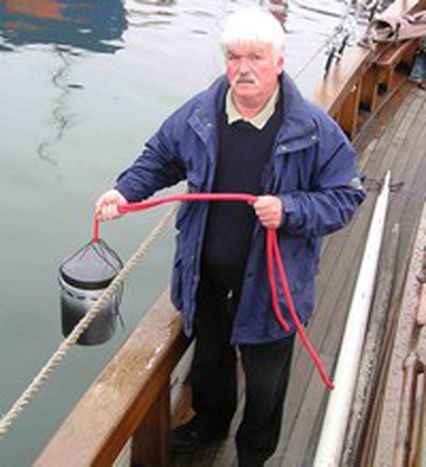
Resting at sea
Published on
Translation by:
 olwen atanackovic
olwen atanackovic
Two to three times a month Hans Peter Klages casts his boat out onto the Polish Baltic Sea. On board he carries the urns of Germans once expelled from their homeland that are to be buried at sea
The small fishing harbour Osada Rybacka lies not far from the port of Gdynia, a city neighbouring Gdask. It is from here that 61 year-old Hans-Peter Klages sets sail in his boat Knudel to deliver the ashes of the deceased to the seas for their final repose. “It is the final will of those passed away to be entombed in Gdask Bay, off the coast of Königsberg, or at another point off the Polish coast,” says the brawny man with thick grey hair.
He has been employed as an undertaker at sea for seven years.
Entombed above shipwrecks
The majority are people who once lived in the area surrounding Gdask and were expelled at the end of the Second World War. “Many would like to return to their homeland and those who survive them follow the wishes of their relatives,” explains Klages. Often they ask to be entombed above the wrecks of sunken ships, in particular the Wilhelm Gustloff, which was capsized by a Russian submarine on 30 January 1945 off Ustka, dragging more than 9000 to their deaths.
The longing of expelled Gdask inhabitants for a burial in their homeland was a theme of Nobel Prize winner Günter Grass’s novel The Call of the Toad, recently adapted as a film. At the end of the war approximately 340,000 Germans had to leave the city and move westwards. The Poles that replaced them had also been expelled, from what today is the Lithuanian capital Vilnius. Grass describes how the Pole, Alexandra, and the German, Alexander, set up a German-Polish Cemetery Association that seeks to establish “cemeteries of reconciliation (Versöhnungsfriedhöfe)” in Gdask and Vilnius. Whereas the project in the novel soon gets out of hand, leading to conflict about a renewed German takeover of land in Gdask, the sea burials of Hans-Peter Klages are without controversy.
Bouquets of flowers on All Saints’
The fact that Klages has only organised two funeral services for Polish families in the past seven years has its roots in local traditions. “The Catholic Church in Poland deems that burial must involve a corpse,” explains Rafal Nowicki, a priest from Gdask. In addition people in Poland are accustomed to visiting the graves of the deceased. Instead, family members of seamen whose bodies remain undiscovered lay flowers at a memorial in Gydnia every All Saints day to remember those lost at sea.
One encounter particularly sticks in Hans-Peter Klages’ mind. It concerned the urn of a woman from Cologne who had earlier lived near Gdynia. Her husband had travelled with the urn and personally scattered the ashes of his wife into the waves on Gdask Bay. The man told the captain that he someday wanted to join his wife. A year later his children called Klages, “The time has come, now we must also bring our father to you.” Klages recalled that they did exactly that. “They had friends here in Gdask that travelled out to sea with them.”
The ship bell tolls four times
Originally Hans-Peter Klages purchased his boat Knudel as a fishing vessel and fifteen years ago he turned it into a yacht. He took it on numerous sailing trips with his Polish wife. A colleague from Hamburg then prompted the sea burials idea. Klages obtained the necessary paperwork and simply began from there.
The ceremonies are more than a job for him. He has been connected to the sea for years and each burial is to him a personal matter. Klages personally undertakes all the preparations. “The urns that I receive are often metallic, so I have to rebury the ashes in urns made of salt,” he says. He then goes on board and arranges the floral decoration. “Then I sail out to a particular position here on Gdask Bay.” The urn is cast into the water from the starboard side of the boat, whilst the ship bell knells four times. Afterwards he steers the boat three times around the site of burial, the flag at half-mast. The floral decoration also goes overboard. The ceremony closes with a trumpeter sounding a final lament.
Translated from Das Meer als letzte Ruhestädte


